DO-IT News July 2009

Volume 17, Number 1
Below are the articles of the DO-IT News July 2009 newsletter. These articles can also be seen all on one page at the Full Newsletter option.
Director's Digressions
Meet the 2009 Scholars
This summer DO-IT will host its annual Summer Study program for DO-IT Scholars. Primary funding for the DO-IT Scholars program is provided by the State of Washington. Additional funding for Scholar activities is provided by the Microsoft Corporation, the National Science Foundation, and the Boeing Company. For information about the DO-IT Scholars program, consult www.washington.edu/doit/do-it-scholars.
We welcome the following '09 Scholars to DO-IT! All are residents of Washington and most will be sophomores or juniors in high school this fall.
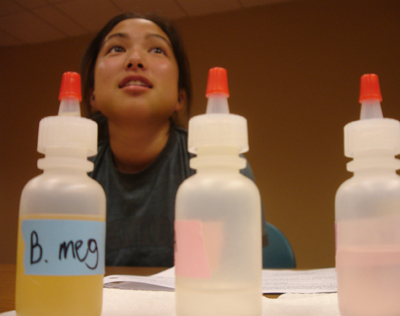
Vanessa, who has cerebral palsy, lives in Yakima. Her goal is to be a medical transcriptionist, librarian, writer, and full time minister of Jehovah's Witnesses. She enjoys advanced placement English and algebra.
Bilal lives in Lynnwood and has a learning disability. He enjoys playing basketball, studying math and English, and learning new things. Bilal would like to be an aerospace engineer.
Reese lives in Mill Creek. He has orthographic dysgraphia as well as binocular, accommodative, and oculomotor dysfunction. His favorite classes are world history and science. He would like to study political science in college and possibly become a political talk show host or actor.
Anna lives in Shoreline. She is partially blind and has a brain tumor. She loves math and science. After earning her degree, she would like to work with children with disabilities.
Ryan has autism. His favorite subjects are math, science, and music. He is a drummer and would like to perform in a group that travels the world. He is also interested in sound engineering, running his own airline, and politics. He lives in Sultan.
Louis' favorite academic courses are science and English. His career interests include shellfish farming, biology, and structural engineering. He has a learning disability and lives in Port Townsend.
Shelby lives in Marysville. She has spinal muscular atrophy. She enjoys studying English and French. She would like to earn a degree and work either in the fashion industry or as a counselor.
Allegra would like to study creative writing and computer technology so she can write novels and be financially stable. She has spinal muscular atrophy II and lives in Seattle.
Sean is interested in United States history and computing. He has muscular dystrophy and lives in Renton. Sean would like to pursue a career in software engineering.
Leonardo lives in Oak Harbor. His favorite classes are English and math. He would like to earn a degree and work in the computer field.
Josh, who has muscular dystrophy, lives in Elma. He enjoys Spanish and world history. He would like to study engineering in college.
Joshua lives in Vancouver. He has spina bifida. His favorite courses are science and English. He would like to become a youth pastor or counselor.
Kristin lives in Bellingham. She has dyslexia and an auditory processing disability. Her favorite classes are advanced placement world history and chemistry. She would like to earn a degree in archeology and travel to foreign countries on digs.
Katelyn has diplegic cerebral palsy and lives in Richland. She enjoys hockey. American literature and psychology are her favorite classes. Katelyn would like to become a professional photographer and share her unique perspective of the world with others.
Alex is from Anacortes. His favorite classes are history and metal technology. He has cerebral palsy and someday hopes to become an airline pilot or work in law enforcement.
Joseph, who has Asperger's syndrome, lives in Des Moines. He hopes to extend his hobby of tinkering with computers into a future career in IT. His two favorite classes are science and history.
Abby, who is blind, lives in Seattle. Her favorite academic courses are French and math. She would like to study information technology.
Chris has attention deficit disorder and dyslexia. He lives in Vancouver. His favorite subjects are science and history and he would like to work in the medical field.
Ambassador Profile
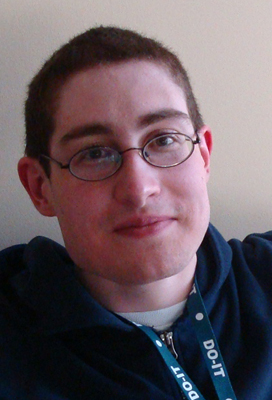
I was a Phase I Scholar in the summer of 2002. In the summer of 2004, I returned as a Summer Study Intern. I first attended Cascadia community college after high school graduation but transferred after one year because the group work did not suit my style of learning. The next year I attended Shoreline community college and discovered an interest in economics (it isn't just for business majors!). In 2005 I transferred to the University of Washington (UW). This spring, I earned two bachelor's degrees-one in political economics and the other in history.
I had a Summer Study internship in 2004 and returned to DO-IT regularly during the following summers to assist in activities. I am currently working as a coordinator/counselor Intern for the DO-IT Center. My primary responsibility is to expand and support the newly initiated Autism Spectrum Condition program. I am also on the Washington State Combating Autism Act Council.
I was recently accepted into the UW Bothell's Master of Arts in policy studies program. I can see how the knowledge of science and technology integrates with the social sciences of politics and economics and that, in the end, an understanding of both worlds is necessary for advancement.
Deaf & Hard-of-Hearing Academy
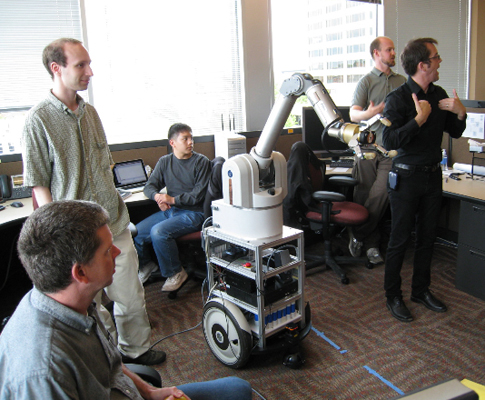
Ten bright deaf and hard-of-hearing students from around the country gathered at the UW Seattle campus on June 18th for the 2009 Summer Academy for Advancing Deaf and Hard of Hearing in Computing, a nine-week academically challenging program designed to increase student experience, knowledge, and interest in computing as a career, in industry or academia. Students are taking a certificated course in animation and computing courses in JavaScript, Java programming, or data structures. They go on field trips to software companies such as Adobe, Google, Microsoft, and Valve, and meet deaf or hard of hearing computing professionals. They are joined by two returning students who are participating as teaching assistants in animation classes and taking a Java computer programming course. Students accepted into the Summer Academy are awarded tuition, room and board, and transportation to Seattle at no cost, thanks to funding from the National Science Foundation. More information on this program can be found at www.washington.edu/accesscomputing/dhh/academy/index.html.
Summer Computing at the UW
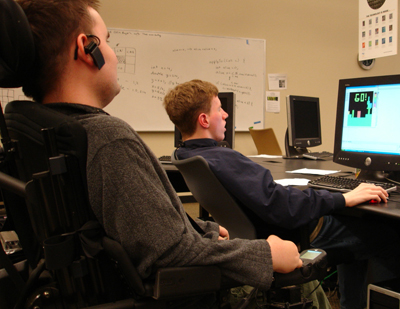
The 2009 Summer Computing Experience is an invitation-only program for deaf and hard-of-hearing high school students who are interested in exploring careers in computing.
During this week long program in August, students will take an intensive course in animation, learn about careers in computing, visit companies such as Adobe and Microsoft, meet deaf and hard-of-hearing role models already working in computing careers, and meet other deaf and hard-of-hearing students who, like themselves, are interested in math and computing. Students are awarded tuition, room and board, and transportation to Seattle at no cost, thanks to funding from the National Science Foundation.
Asperger's Transition to STEM
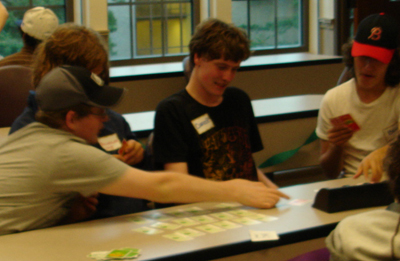
On August 8, 2009, DO-IT will host an Asperger's Transition to STEM workshop at the UW Seattle. It will acquaint high school students on the autism spectrum with the process of transitioning to college, opportunities offered by AccessSTEM, and tips from college-age Ambassadors with Asperger's syndrome. Students will learn how to apply for AccessSTEM internships, will hear the diverse options for internships through AccessSTEM, and will learn how AccessSTEM internships can help in selecting a college and can influence future employment. Lunch will be provided. For more information, contact Mike Lewis, DO-IT staff, at (206) 685-3648.
High School Students with Disabilities Participate in Transition to College Workshop
On April 9, 2009, students from four Seattle high schools participated in a Transition to College event at Seattle Central Community College (SCCC). Outreach and Recruitment Coordinator Gina Nakamura, kicked off the event with an enthusiastic presentation on what a community college has to offer. She explained some of the differences between two- and four-year institutions to an attentive group of high school students and staff. Students asked many thoughtful questions regarding the variety of offerings, testing, and admissions procedures, as well as social opportunities.
Al Souma, Counselor with Disability Support Services (DSS), provided information related to receiving accommodations in college. Student comments and questions reflected surprise at some of the differences between high school and college disability services; for example, documenting a disability, requesting accommodations, and working with instructors. Students also learned that each college campus is different. Remember, it's always important to check in early with the DSS office on the campus you are applying to in order to get information about the specific requirements at that school!
A panel comprised of students with disabilities from Bellevue College, SCCC, and UW shared their experiences and answered questions. The information shared by the panelists drew attention to the need for students with disabilities to develop self-determination skills in order to take charge of their education and reinforced the point that high school and college disability services have different expectations of students.
Following campus tours, students returned to their high schools armed with more information to continue planning their transition to college!
Web Accessibility Training for Students
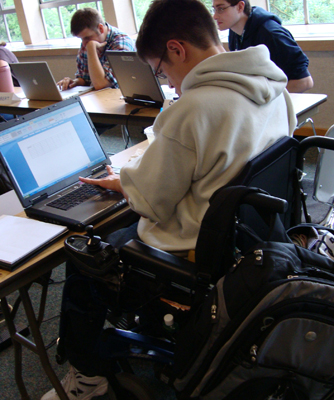
Have you ever wondered how to make websites more usable on iPhones and other smart phones? This summer, a group of eight students with disabilities living in the Seattle area got the chance to explore this fascinating area of web accessibility and earned money doing it while participating in the six-day Web Accessibility Training. Students learned how the web works, and how they can make it more accessible for more people.
The web has become integral in our daily lives, whether we are working, learning, playing, or shopping. Inaccessible websites can create barriers. Learning how to make the web accessible for everyone can open up whole new worlds.
The Web Accessibility Training helped students make our world a better place, gave them a head start on building a good resume, and opened doors to an interesting career path! The project was funded by the National Science Foundation.
Seizing an Opportunity: From Scholars to Interns
Did you know that DO-IT has many opportunities beyond the DO-IT Scholars Summer Study program?
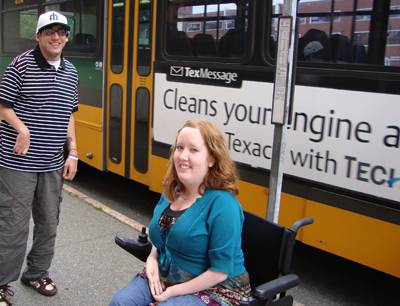
We are both DO-IT Ambassadors, DO-IT Scholar graduates, and college students. Over the past few months, we have been working as AccessSTEM and AccessComputing Interns at the DO-IT Center. As Interns, we help with conferences and other outreach events to spread the word about opportunities for students with disabilities through the NSF funded AccessSTEM (for students with disabilities interested in science, technology, engineering, or mathematics) and AccessComputing (for students with disabilities interested in IT) programs. We are often out and about in the Puget Sound region distributing information and resources. You might see us staffing DO-IT booths at conferences, like the Seattle Public Schools' Special Education Fair or the Northwest Council for Computer Education convention, to help educators, parents, and professionals find resources for students with disabilities.
With our internship opportunities, we've traveled from Portland, OR to Bellingham, WA. At Western Washington University, we co-hosted a disability awareness event where students learned about computing careers and internships. We also engage in panel discussions like those at a DO-IT Scholars gathering as well as an event for local high school students at Seattle Central Community College. During panel discussions, students with disabilities are able to ask questions about the transition to college process and our experiences as Interns. At the recent UW Career Fair, we gave students with disabilities information about how to get internships and jobs through AccessSTEM and AccessComputing. At Nelson Middle School's Impact Day, we presented a workshop about college and jobs for students with disabilities. We also recently spoke to a group of UW physical and occupational therapy graduate students as part of one of their graduate classes.
As you can see, we've been very busy in our internships! This opportunity has helped us develop our interests in STEM fields and learn more about computing. It has helped us network and has added great experience to our resumes. Work-based learning opportunities and other internships are great ways to explore your interests. We encourage you to explore internship opportunities for yourself. Remember, we're both on the doitchat email discussion list, and we are always happy to answer any questions you have!
The Internship Quiz
This year DO-IT will help students participate in more internships than any other year. This is due to DO-IT's success with funded projects and ongoing programs such as AccessSTEM, AccessComputing, DO-IT Scholars, and AccessCAREERS.
How much do you know about internships? Take this quick true/false Internship Quiz and see how you do:
- Interns usually do beginner-level tasks or grunt work. (T/F)
- Internships are really hard to get and only go to top students. (T/F)
- To be an intern, I will have to work for free. (T/F)
- An internship is nice, but it won't help me get a permanent job. (T/F)
- Internships aren't worth much unless I can get academic credit. (T/F)
- An internship is the same thing as a part-time job. (T/F)
- Internships always happen during the summer. (T/F)
- Internships are only for students who know their career goals. (T/F)
- There are no special intern programs for students with disabilities. (T/F)
The answer key for this quick quiz is simple—all of the above statements are false! Interns are often involved in complex and important projects. Placement can be competitive, but there are a lot of places to look—even for struggling students. Many internships are paid, and all internships can help you build your network for future job searches. Even if they do not give credit, which is common, internships help students build their resumes and learn valuable skills. Internships are different from part-time jobs, because interns receive special training and instruction—they are expected to be learning new skills. Internships can happen any time of year and are excellent for students who are still figuring out their career goals. And what about special internship programs for students with disabilities? Here are a few examples:
- AccessSTEM
https://www.washington.edu/doit/accessstem-team-application - AccessComputing
www.washington.edu/accesscomputing/team_app.html - ENTRY POINT!
ehrweb.aaas.org/entrypoint/ - American Association of People with Disabilities Internship Programs
www.aapd.com/what-we-do/employment/internship-program/
Networking Night
This spring, DO-IT hosted an AccessSTEM Networking Night at the UW. The event kicked off bi-monthly meetings for high school and college students on the autism spectrum. During this first meeting, we discussed how students in the group want to communicate with each other using technology; they decided to stick with the current email-based forum. Other topics included issues specific to students on the autism spectrum; science, technology, engineering, and mathematics (STEM) academic and career options; and tips from other students on how to succeed in college life. Students were also able to network and reconnect with one another and enjoy pizza together. Bi-monthly meetings will be held throughout the year.
A Major Explosive Event
On March 27, 2009, at 9:27a.m., Alaska's Mount Redoubt volcano exploded, kicking out debris that reached more than 65,000 feet into the atmosphere. The Alaska Volcano Observatory described the blast as "a major explosive event." At the same time, DO-IT, in partnership with the University of Alaska Anchorage (UAA), invited a group of eighty high school seniors with disabilities, along with their teachers and parents, to a transition event on campus. The UAA Transition to Computing event exposed students, teachers, and parents to computing programs on campus and told them how to prepare for the transition from high school to college. The director of the UAA Disability Support Services (DSS) worked with computing faculty, other campus partners, and the local K-12 school district to arrange activities for the students. Specifically, they:
- visited the campus and toured the computing department
- received printed information about computing programs
- met with college students who have disabilities
- ate lunch in the campus cafeteria
- toured the DSS office and met DSS staff
- filled out a college application to UAA, with the application fee waived
Although Mount Redoubt offered some fireworks of its own, this Transition to Computing activity was a major event, too—helping students with disabilities apply for college and learn about computing!
The DO-IT Network
This spring the DO-IT family gathered for an evening of networking. Participants in all of DO-IT's programs were invited to join us in Seattle and Pasco. The turnout was fabulous. We saw the video debut of profiles of DO-IT Scholars Maria, Nate, Mack, Alexandra, and Heidi. You can view them online at www.washington.edu/doit/videos/index.php. We also heard from AccessSTEM and AccessComputing participants about their academic and work-based learning experiences.
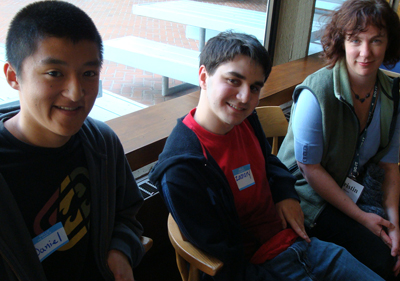
Kayla Brown, Bellevue College student, spoke about her interest in psychology and her experience as an AccessSTEM Intern at a local non-profit, as well as her experience working for City Year that also helped fund her education.
Alexandra MacKenzie, UW senior in biochemistry and AccessSTEM Intern, talked about her work in several laboratories and how she funded much of her education through grants.
Noah Seidel, sophomore at the UW and AccessComputing Intern, spoke about his experiences working on computing-based projects, including an electronic photo directory and Second Life virtual reality.
Heidi Wangelin, a freshman at Cascadia Community College, spoke about her interest in science libraries and her upcoming paid AccessSTEM internship at NOAA (National Oceanic and Atmospheric Administration) in their science library.
There was also plenty of time to network and reconnect; I even saw a game of Apples to Apples! We hope that you will join us for our next networking event in October 2009.
Tech Tips: Video, the Web, and You
In a recent conversation on the doitchat email discussion list, subscribers offered ideas about how to share their personal video files. This article summarizes that discussion and provides a step-by-step guide to sharing video on YouTube.
Why YouTube? According to market research, YouTube is miles ahead of the competition and makes up nearly half of all visits to video sites, with hundreds of millions of videos viewed each day. YouTube's closest competitor in the past was Google Video, but in 2006 Google bought YouTube, and as of January 2009, Google Video no longer accepts uploads from users.
So, here's how to share videos using YouTube:
- To upload videos on YouTube, you must first have an account and be signed in. Go to www.youtube.com, select "Sign In." If you don't have an account, select "Sign up for YouTube." Then, follow the prompts to create an account (it's free).
- If you haven't already done so, save the video to your computer's hard disk drive. YouTube supports a wide range of video file formats, including .avi, .mov, .flv, .mp4, .mpeg, .3gp, and others.
- After signing in to YouTube, select the "Upload" button. This will take you to the Video File Upload page. Read the instructions on the page, or simply select the "Upload Video" button, then find and select the video file on your computer.
- Enter a title, description, and tags (keywords) for your video and select the most appropriate category from the choices provided.
- Under the "Privacy" heading, select "Private." This means you can select the people who you want to see your video, rather than sharing it with the entire world. Even if you want to share your video publicly, it's a good idea to select "Private" initially so you can screen the video to make sure it was uploaded correctly. If all is well, you can change this setting later to make your video available to the world; and if there are problems with the video, you can delete it and try again without anyone having seen it but you.
- Videos can be up to ten minutes in length or one gigabyte in size. Occasionally you may run across videos on YouTube that exceed these limits. That's because they were uploaded by users who have special accounts. For example, DO-IT has a "YouTube Educational Partner" account, featuring all of the videos we've produced over the years, most of which are longer than ten minutes.
- After you have finished uploading your video, go to "My Videos," and locate the title of the video you just uploaded. Once there, you will find information about the video, including its current status. Initially, the status will probably be "Uploaded (processing, please wait)." This process may take a very long time, depending on the length and quality of the video.
- While you're waiting for YouTube to process your video, you can add the finishing touches, such as inviting specific people to view it and adding closed captions so you can share your video with people who are deaf or hard of hearing. To add these and other finishing touches, select the "Edit" button that is associated with your video. This will take you to a Video Details page.
- To share your video with specific people, locate the "Broadcasting and Sharing Options" section of the Video Details page. You can only share your video with people who have YouTube accounts and who are listed among your YouTube "friends." In the box provided, you can select which of your YouTube friends you would like to share your video with, and they will receive an email that includes a link to your video. To add new YouTube friends, or to invite people who do not yet have YouTube accounts, select the "Edit Contacts" link at the top of the friends box.
- To add closed captions to your video, click on "Captions and Subtitles" on the Video Details page. You will be prompted to upload a caption file from your computer. Caption files come in various formats, but YouTube supports caption file formats known as SubRip (*.SRT) or SubViewer (*.SUB). These files are plain text files, with captions separated by a blank line. Each caption includes a time code on one line, followed by the caption text on the next one or two lines. Captions can be written by hand, although it's usually quicker to use any of the free websites or software tools that are available. (There are more detailed instructions and a list of available tools linked from the YouTube Captions and Subtitles page.) After you have uploaded your caption file, the caption text will automatically appear at the bottom of the video screen, and can be toggled on and off with the CC menu (in the lower right corner of the YouTube media player).
YouTube is capable of much more. However, for those of you who are new to YouTube, hopefully this article will help you get started. While on YouTube, be sure to check out the DO-IT Channel at www.youtube.com/user/TheDOITCenter.
The Thread—Qualities of a Good Intern
I posed the following question within our Internet discussion forum. I will share with you some of the responses so that you can get a flavor of the many rich conversations the DO-IT community has online.
Soon, DO-IT Scholars/Ambassadors who have not yet been Interns for Summer Study will have a chance to apply for the program. Those who are accepted into internship positions will live in the dorms with the Scholars and help with computer lab activities, field trips, recreational activities, and other Summer Study events and operations. Ambassadors, Mentors, what would you say are the best qualities for an Intern to have? What should we be looking for as we evaluate applications for these positions?
DO-IT Ambassador: I'd say that the ability to know when to act as a friend and when to act as a leader is a very important quality to possess.
DO-IT Staff: You make a good point. It can be hard when you are in a near-peer situation to take on the role of authority when necessary, but it is an important role to be willing and able to take.
I also think Interns need to be good at time management. They don't get told when to go to bed, but are some of the hardest-working folks. They need to be in touch with their limits and advocate for themselves so they are able to do their job and stay healthy.
DO-IT Staff: I would add that a good Intern is the kind of person that will maintain good communication with the supervisor. This applies to any internship.
DO-IT Ambassador: The purpose of being an Intern is to learn what it takes to do the job without the same pressures of actually having the job. Social interactions are a must for any work situation, including an internship.
DO-IT Staff: I find that someone being alert to what is going on and taking the initiative to get things done is a key skill for not only Interns but staff as well.
DO-IT Staff: In my opinion, a top quality to have would be the ability to be an effective role model to the younger Scholars as well as to your peers and fellow Interns. This would include the ability to demonstrate appropriate and professional behaviors in communication as well as in actions, along with the ability to inspire and motivate others to grow personally and academically.
DO-IT Ambassador: One of the most important things I did as an Intern was to be welcoming and open to the new Scholars. It's different from the first two years at Summer Study because you are there to support Phase I and II Scholars and the staff, rather than to only focus on having fun and learning in the sessions.
One of the biggest challenges is learning to draw a line between your role as a Scholar and your role as an Intern because you fall somewhere between the new Scholars and the staff. You constantly have to keep in mind your responsibilities for each day and balance that with helping the Phase I and Phase II Scholars feel comfortable and have fun.
DO-IT Ambassador: Here are some qualities of a good intern that my professors from undergraduate and graduate school believed to be important:
- Strong interpersonal skills
- Ability to multi-task
- Taking constructive criticism well
- Strong writing skills
- Punctuality
- Effective communication
DO-IT Ambassador: In my opinion, knowing when to say, "I don't know" is also important. Many new Scholars are going to have questions, and, even though you have been in the program for a few years, you are still not going to have all the answers. This is OK. Being an Intern means you are learning as well. The best response I have ever heard was "I do not know the answer to this, but I do know who would." WOW. You have just shown that, no, you don't know the answer, but you still know how to find the answer.
DO-IT Scholar: Hello everyone! One of the most important things I learned from my internship was how to be a more confident person. DO-IT offers other internships outside of Summer Study, and I did an internship in the area of real estate. In real estate you are helping people find and purchase their dream homes or helping them sell a home, so you have to be really confident in what you are communicating to your client. What I want everyone to get out of this is that when you get into an internship that fits your career goals, just have confidence in yourself that you can do it and you will do it!
DO-IT Ambassador: Appearance is always important in any internship. Men should take care of any facial hair they may have, dress nicely, shower regularly. Women should do the same, minus the facial hair problem. The way you present yourself either in the job world or internship helps to make a great impression and allows people to feel more at ease with you. One of my college professors made a comment that stuck with me even to this day—dress for success. If you walk into an interview dressed in business attire you will be more likely to get the job than the person next to you if they are wearing ragged jeans and T-shirt. When you are an intern you have been given the chance to potentially get hired on with that company full time. If you dress for success every day you show up for work, then the company where you are an intern will remember you when they are considering candidates for a job, even if you struggled to learn the job. You have already got your foot in the door, and this could mean the difference between a well-paid job and a minimum wage position.
DO-IT Ambassador: I would say that dressing appropriately is more of an issue when first making an impression than in the day-to-day work environment (there are often office dress codes as guides, otherwise just use good judgment). I'd say that an intern must have a willingness to learn new things, and, in order to do that, an intern must be flexible if it is to be a meaningful experience.
From my experience as an Intern, you won't learn all of the material or tasks an Intern does, but you will learn the processes behind the scenes and how to figure out what you need to know. It really is essential to acknowledge that an internship is a different type of learning that is generally not learned through course work.
As far as general job skills go, an Intern needs to be responsible and have effective time management skills, which includes prioritizing tasks effectively. No boss, or professor even, will accept that you didn't get an important project done because you were working on something else.
DO-IT Ambassador: I would like to add two additional comments:
- Communication is important. You need to be able to communicate to your coworkers/supervisors what you need. Be prepared to answer questions, especially when you are training others.
- Be willing to adjust to other people's learning styles. This is the most important lesson I learned when I was a volunteer. I had two clients whom I trained on the computer and they both had different ways of learning. One liked to learn via verbal communication, but she would take notes while I was talking to her. My other client liked to have her instructions written out so she could follow them at her own pace. When you are doing an internship that requires you to train others, you really need to be able to adjust to their ways of learning.
How Can You DO-IT?
- Sign up to receive DO-IT News if this newsletter was not mailed directly to you.
- Volunteer as a Mentor or to help with one of our Summer Study programs.
- Pass this newsletter on to someone you know who can benefit from our programs.
- Donate money to support and extend DO-IT activities including sponsoring Scholars from states outside of Washington, special events, work-based learning experiences, participant attendant or travel costs, refreshments for program participants, and creation and distribution of educational videotapes and publications.
DO-IT today by completing the form below! You may also make a secure online credit card donation at the University of Washington Make a Gift page by selecting the "DO-IT Program Gift Fund" option.
___ Sign me up to receive copies of DO-IT NEWS, a free program newsletter.
___ Send me more information about DO-IT volunteer opportunities.
___ I would like to make a donation (payable to the University of Washington, Federal ID#91-6001537) to support DO-IT operations.
___ I have enclosed a check for $____________
___ Please charge $____________ to my credit card.
___ VISA ___ Mastercard
Date _____________
Card Number __________________________ Expiration Date _____________
Card Holder Name ___________________________________________________
Signature _____________________________________________________
Address ____________________________________________________________
City __________________________ State _____________ Zip ____________
Phone: Home __________________________ Business ____________________
E-mail: ____________________________________________________________
Your gift is tax-deductible as specified in IRS regulations. Pursuant to RCW 19.09, the University of Washington is registered as a charitable organization with the Secretary of State, State of Washington. For more information, call the Office of the Secretary of State, 1-800-322-4483.
Mail to:
DO-IT
University of Washington
Box 354842
Seattle, WA 98195-4842
Thank you!
More About DO-IT
DO-IT News is published at the University of Washington with input from DO-IT staff, Pals, Scholars, Ambassadors, and Mentors. DO-IT is primarily funded by the National Science Foundation, the U.S. Department of Education, and the State of Washington.
DO-IT (Disabilities, Opportunities, Internetworking, and Technology) serves to increase the successful participation of individuals with disabilities in challenging academic programs such as those in science, engineering, mathematics, and technology. Primary funding for DO-IT is provided by the National Science Foundation, the State of Washington, and the U.S. Department of Education. DO-IT is a collaboration of UW Information Technology and the Colleges of Engineering and Education at the University of Washington.
Grants and gifts fund DO-IT publications, videos, and programs to support the academic and career success of people with disabilities. Contribute today by sending a check to DO-IT, Box 354842, University of Washington, Seattle, WA 98195-4842.
Your gift is tax deductible as specified in IRS regulations. Pursuant to RCW 19.09, the University of Washington is registered as a charitable organization with the Secretary of State, state of Washington. For more information call the Office of the Secretary of State, 1-800-322-4483.
To order free publications or newsletters use the DO-IT Publications Order Form; to order videos and training materials use the Videos, Books and Comprehensive Training Materials Order Form.
For further information, to be placed on the DO-IT mailing list, request materials in an alternate format, or to make comments or suggestions about DO-IT publications or web pages contact:
DO-IT
University of Washington
Box 354842
Seattle, WA 98195-4842
doit@uw.edu
www.uw.edu/doit
206-685-DOIT (3648) (voice/TTY)
888-972-DOIT (3648) (voice/TTY)
206-221-4171 (fax)
509-328-9331 (voice/TTY) Spokane
Founder and Director: Sheryl Burgstahler, Ph.D.